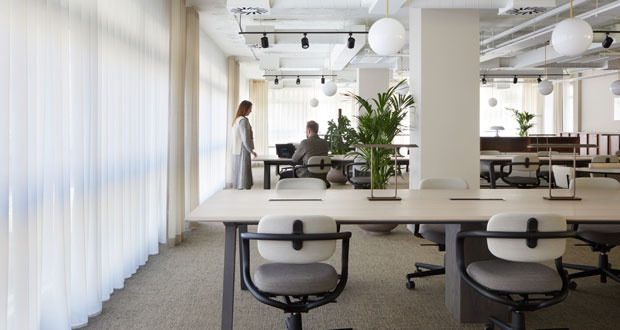October is ADHD Awareness Month. To mark it, inclusive workplace design specialist Motionspot surveyed 1,000 neurodivergent office workers and 1,000 neurotypical office workers about the key issues they face working in offices.
The growing number of adults receiving an ADHD diagnosis in the UK, means millions of people are now learning to live and work differently. As companies increasingly ask employees to return to working in offices, new research has revealed how the design of the office environment impacts neurodivergent workers.
Neurodivergence is a term used to describe a range of neurological differences including (but not limited to): ADHD, autism, Tourette’s syndrome, dyslexia, dyspraxia, and dyscalculia.
Given that 78 per cent of neurodivergent employees report spending three or more days per week at the office (18 per cent higher than neurotypical colleagues), the research has highlighted the need for employers to consider whether the work environment caters to a diverse workforce. To support neurodivergent employees, companies need to review the design of their offices and consider how to support employees with diverse needs and conditions.
In the survey, the biggest challenges neurodivergent respondents face in the office are:
- Frequent distractions – 35 per cent
- Anxiety in social situations – 35 per cent
- Fatigue and burnout – 34 per cent
- Brain fog – 32 per cent
- Sensory overload – 31 per cent
Research from Harvard Business Review states that organisations that actively promote inclusivity generate 19 per cent more revenue. Yet Motionspot’s research shows that 22 per cent of neurodivergent applicants reported not accepting a job that was otherwise suitable due to the design of the physical workplace environment.
Notably, 15 per cent of neurodivergent respondents stated they had left a job due to the design of the physical workplace environment.
The survey revealed the need for a choice of workspaces to suit different tasks and sensory needs. Sixty per cent of neurodivergent workers stated they prefer to move around different areas of the office during the day dependent on the type of work they are doing. Other features that neurodivergent respondents benefit from include:
- Private rooms or ‘nooks’ around the office to carry out private tasks – 82 per cent
- Informal rooms with soft furniture for creative collaboration – 70 per cent
- A private and quiet space to lie down and rest in the workplace – 64 per cent
- Spaces designed with an informal ‘café style’ atmosphere – 52 per cent
- A private sensory room with soft furniture, adjustable lighting, ambient sounds, and video projections – 14 per cent
Jason Slocombe, Neurodiversity Design Specialist at Motionspot said: “This study not only shows that neurodivergent workers are in the office as many days as anyone else, but they also spend as much time in meetings. Neurodivergent workers also expressed a preference for meetings to be ‘in-person’ which reinforces the importance of high-quality, inclusive, and accessible workspaces, that bring a new focus to support sensory, informational, social and communication needs.
“One of the most important statistics in this research, is the number of neurodivergent people who have either left a job or declined a job offer because of the physical design of the workplace. We know from previous research that workplace design has a significant impact on employee experience, but what we were not aware of was how the built environment and the current talent shortage employers are experiencing seem to be related.”
Ed Warner, CEO and Founder of Motionspot added: “The results of our study demonstrate there is some way to go before neurodivergent employees are given the support they need in the workplace. The design of the built environment has such an impact on performance as well as recruitment and retention of the best talent.
“The most successful businesses will be the ones that recognise the unique strengths, creativity and innovative thinking of neurodivergent staff and design their workplaces to enable all staff to thrive at work.”
To see the results of the research and how businesses can create a more inclusive workplace click here.





